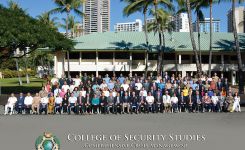- Daniel K. Inouye Asia-Pacific Center for Securi...
- Working through complexity: Fellows learn criti...
Working through complexity: Fellows learn critical thinking approach to crisis management
Managing disasters or crises presents challenges that are anything but simple. A host of involved government and nongovernment actors, impacted populations that are often ethnically, politically and cultural diverse, and myriad interconnected processes can make planning, response and recovery actions overwhelmingly complex.
Teaching security practitioners to work through this complexity by thinking systemically and strategically was the aim of the Feb. 11 to March 16 Comprehensive Crisis Management course (CCM 16-1) held at the Daniel K. Inouye Asia-Pacific Center for Security Studies. One hundred twenty Fellows from 38 locations took part in the course.
CCM is an executive education program designed to educate and build resilient capacity among security practitioners for crisis preparation, response and recovery. It helps participants develop a comprehensive understanding of crisis and disaster management with a focus on the strategic impacts of decisions and actions before, during and after events.
CCM 16-1 began with three plenary sessions focused on complexity. Course manager Herman Finley said these were foundational to thought processes used throughout the course, particularly in application exercises.
“Most Fellows are trained in ‘linear complicated’ problem-solving. Their approach is ‘me and my team will analyze the problem and come up with solutions to fix it.’” Finley explains, however, that problems often exist within of a complex system that is constantly changing and comprised of many interconnected elements. Thus, when one actor within a system evaluates and tries to solve a problem, it impacts other actors within the system, creating a loop of often unintended consequences.
This course, then, attempted to help Fellows manage crises by looking at them comprehensively, using a causal loop to identify and frame related issues, then developing strategies to change an associated system over time. The approach required considering the perspectives of all actors, evaluating impacts of actions taken and working collaboratively to overcome challenges.
“The overarching thing I got out of the lectures (on complexity) was this concept of not trying to find a single solution…that these things are so challenging that its more about managing the situation to achieve an outcome,” said Australian Air Force Squadron Leader Daniel Drinan.
Drinan said his group used this mindset to evaluate impacts of the 2010 earthquake that decimated Port-au-Prince, Haiti, killing more than 200,000 people. He related the country already had underlying instability prior the earthquake. His team framed the context of problems posed and developed suggested actions.
Later in the course, a capstone exercise enabled Drinan and his Fellow participants to apply knowledge built through a series of topical plenary lectures, seminar discussions, exercises, on-island site visits, case studies analysis and electives.
The capstone scenario called for each of nine CCM seminar groups to act as a different government ministry in an underdeveloped, fictitious nation wracked by spread of a communicable disease. Each group analyzed available data, considered capabilities and challenges, then developed response proposals for the nation’s prime minister. Nine task forces were then formed containing members from each of the nine ministries. They worked through competing ministry priorities to develop and brief agreed-upon courses of action to national leadership.
The course’s whole-of-society approach earned praise from CCM Fellow Winston Almeda. “I think, in the context of crisis management, appreciating all the players in society was very meaningful.”
Almeda, who is a special assistant with the Philippines Department of Foreign Affairs, added the entirety of CCM was “marvelous…very enriching personally, and more importantly, professionally as a practitioner of crisis management for my organization.” He noted the course’s emphasis on critical thinking. “Thinking comprehensively — both from the perspectives of government organization and as a nation — I found it very important and a benchmark for analyzing (issues).”
Almeda was joined in CCM by participants from Afghanistan, Australia, Bangladesh, Bhutan, Cambodia, Canada, China, Egypt, Fiji Islands, India and Indonesia. Fellows also came from Kiribati, Laos, Malaysia, Maldives, Marshall Islands, Micronesia, Mongolia, Myanmar, Nauru, Nepal, New Zealand, Pakistan, Palau, Peru, Philippines, Republic of Korea, Rwanda, Samoa, Solomon Islands and Sri Lanka. Also taking part were Fellows from Taiwan, Thailand, Timor- Leste, Tonga, United States, Vanuatu, and Vietnam.
CCM is one of six formal courses at APCSS. The center is a Department of Defense institute that addresses regional and global security issues. Military and civilian representatives, most from the United States and Asia-Pacific nations, participate in a comprehensive program of executive education, professional exchanges and outreach events, both in Hawaii and throughout the Asia-Pacific region.
The Center supports U.S. Pacific Command by developing and sustaining relationships among security practitioners and national security establishments throughout the region. APCSS’ mission is to build capacities and communities of interest by educating, connecting and empowering security practitioners to advance Asia-Pacific security. It is one of the Department of Defense’s five regional security studies centers.
Since opening in 1995, more than 10,000 alumni representing over 122 countries and territories have attended APCSS courses and workshops.
-END-



